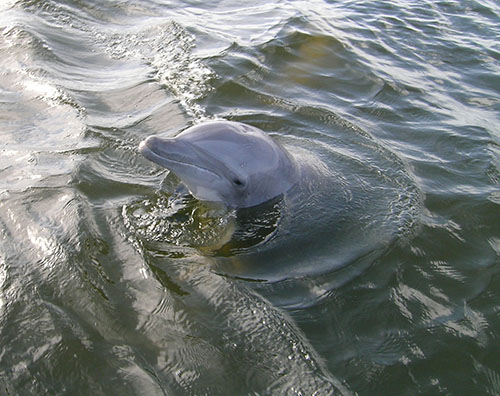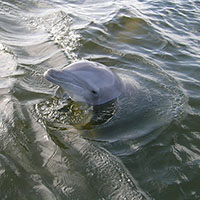Tuesday, February 13, 7 p.m., Camp Orkila
— from Justin Cox for SeaDoc Society —

Bottlenose dolphin by Joe Gaydos, SeaDoc Society
Several years ago, a virus swept through bottlenose dolphin populations on the Atlantic coast killing about half of the inshore population. If a similar disease outbreak were to hit southern resident killer whales, it could potentially mean the end of the population.
Disease can play a large role in wildlife population decline, which is why SeaDoc Society Science Director Dr. Joe Gaydos will present on the topic at the next Marine Science Lecture Series at YMCA Camp Orkila’s Larry Norman Hall on February 13 at 7 p.m. (Note that while most lectures are held at Emmanuel Episcopal Church, this one will be at Camp Orkila). The event is free.
“Disease can be as important as predation in shaping populations and ecosystems,” said Gaydos. In his lecture, he will describe how people and wildlife can pass diseases to one another, and how human activities can make wild animals more susceptible to disease in the first place. Some examples include contaminates that we put into the ecosystem and prey availability, like a shortage of salmon for southern residents.
The 2017-2018 Marine Science Lecture Series is presented by the SeaDoc Society and YMCA Camp Orkila. It is designed to inspire the general public and to highlight the amazing fish and wildlife of our region. Lectures are free.
The Lecture Series is presented by program partners The SeaDoc Society and YMCA Camp Orkila. It has been made possible through generous sponsorship by The Averna Family (Deer Harbor Charters), Barbara Bentley, Barbara Brown, Emmanuel Episcopal, Audrey and Dean Stupke, Orcas Island Community Foundation and West Sound Marina. For more information visit www.SeaDocSociety.org/events.
**If you are reading theOrcasonian for free, thank your fellow islanders. If you would like to support theOrcasonian CLICK HERE to set your modestly-priced, voluntary subscription. Otherwise, no worries; we’re happy to share with you.**








